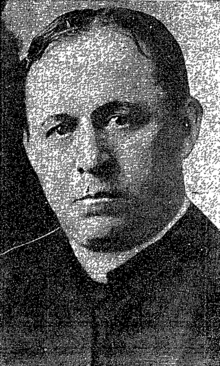
Loyola School is an American Jesuit high school on the Upper East Side of the Manhattan borough of New York City New York, founded in 1900 by the Society of Jesus. It is located two city blocks east of Central Park and Museum Mile on 83rd Street and Park Avenue.

Francis Ignatius Neale, also known as Francis Xavier Neale, was an American Catholic priest and Jesuit who led several academic and religious institutions in Washington, D.C., and Maryland. He played a substantial role in the Jesuit order's resurgence in the United States.
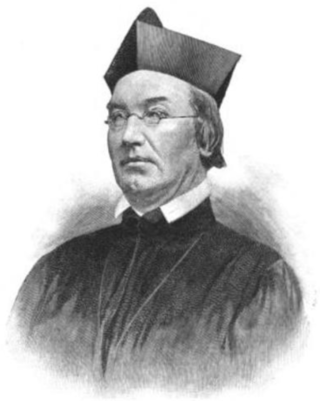
John Early was an Irish-American Catholic priest and Jesuit educator who was the president of the College of the Holy Cross and Georgetown University, as well as the founder and first president of Loyola College in Maryland. Born in Ireland, he emigrated to the United States at the age of nineteen. Upon his arrival, he enrolled at Mount St. Mary's Seminary in Maryland and entered the Society of Jesus, completing his education at Georgetown University in Washington, D.C.
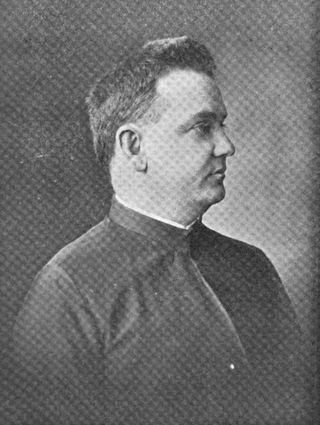
William George Read Mullan, SJ, was an American Jesuit and academic who served as President of Boston College from 1898 to 1903 and President of Loyola University Maryland from 1907 to 1908.
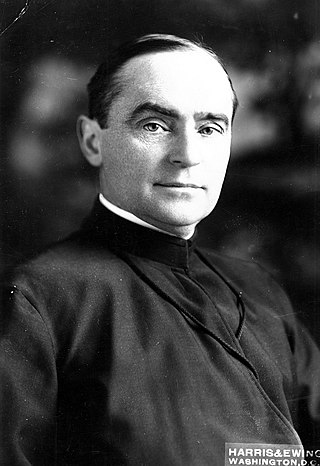
Alphonsus J. Donlon was an American Catholic priest and Jesuit who spent his career in priestly ministry and academia, including as president of Georgetown University from 1912 to 1918. Born in Albany, New York, he garnered a reputation as a good student and an exceptional collegiate athlete. As a professor, he went on to lead Georgetown University's sports program, which enjoyed great success. As a result, he became known as the "father of Georgetown athletics." He served as a professor of various sciences at Georgetown University and at Woodstock College, and as president of the former, he oversaw the removal of Georgetown Preparatory School from the university to a separate campus, and proposed the creation of the School of Foreign Service. For a significant portion of his career, he also served as a chaplain to Georgetown Visitation Monastery. In his later years, he engaged in pastoral work at St. Francis Xavier Church in New York City and taught at Fordham University.

Charles William Lyons was an American Catholic priest who became the only Jesuit and likely the only educator in the United States to have served as the president of four colleges. Born in Boston, Massachusetts, he attended the local public schools before entering the wool industry. He abandoned his career in industry to enter the Society of Jesus. While a novice in Maryland, he suffered a nervous breakdown and was sent to Georgetown University as prefect. He then resumed his studies at Woodstock College, teaching intermittently at Gonzaga College in Washington, D.C. and Loyola College in Baltimore. After his ordination, he became a professor at St. Francis Xavier College in New York City and at Boston College.
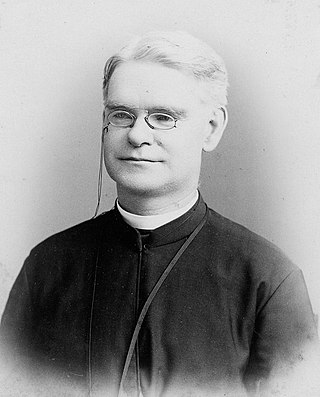
James Aloysius Doonan was an American Catholic priest and Jesuit, who was the president of Georgetown University from 1882 to 1888. During that time he oversaw the naming of Gaston Hall and the construction of a new building for the School of Medicine. Doonan also acquired two historic cannons that were placed in front of Healy Hall. His presidency was financially successful, with a reduction in the university's burdensome debt that had accrued during the construction of Healy Hall.

Anthony Francis Ciampi was an Italian priest of the Catholic Church and member of the Society of Jesus.

Samuel A. Mulledy was an American Catholic priest and Jesuit who served as president of Georgetown College in 1845. Born in Virginia, he was the brother of Thomas F. Mulledy, who was a prominent 19th-century Jesuit in the United States and a president of Georgetown. As a student at Georgetown, Samuel was one of the founding members of the Philodemic Society, and proved to be a distinguished student, which resulted in his being sent to Rome to complete his higher education and be ordained to the priesthood. Upon his return to the United States, he became the master of novices at the Jesuit novitiate in Maryland, before being named president of Georgetown. He sought to be relieved of the position after only a few months, and returned to teaching and ministry.

Jerome Daugherty was an American Catholic priest and Jesuit who served in many different capacities at Jesuit institutions throughout the northeast United States, eventually becoming president of Georgetown University in 1901. Born in Baltimore, he was educated at Loyola College in Maryland, before entering the Society of Jesus and becoming a member of the first class at Woodstock College. He then taught various subjects, including mathematics, Latin, Ancient Greek, rhetoric, and the humanities in Massachusetts, New York City, and Washington, D.C., and served as minister at many of the institutions there.

John Dunning Whitney was an American Catholic priest and Jesuit who became the president of Georgetown University in 1898. Born in Massachusetts, he joined the United States Navy at the age of sixteen, where he was introduced to Catholicism by way of a book that accidentally came into his possession and prompted him to become a Catholic. He entered the Society of Jesus and spent the next twenty-five years studying and teaching mathematics at Jesuit institutions around the world, including in Canada, England, Ireland, and around the United States in New York, Maryland, Boston, and Louisiana. He became the vice president of Spring Hill College in Alabama before being appointed the president of Georgetown University.
Francis Xavier Brady was an American Catholic priest and Jesuit. Born near Gettysburg, Pennsylvania, he studied at Woodstock College, and held positions in various Jesuit institutions before becoming President of Loyola College in Maryland in 1908. He held the office until his death in 1911.
James A. Ward was an American Catholic priest and Jesuit. He taught for many years at Georgetown and at the novitiate in Frederick, Maryland, of which he twice served as rector. He then became the vice president of Georgetown and was influential in the early years of Loyola College in Maryland. From 1857 to 1860, he was the President of Saint Joseph's College. He spent his later years as socius (assistant) to the Jesuit provincial superior in New York City, and teaching.
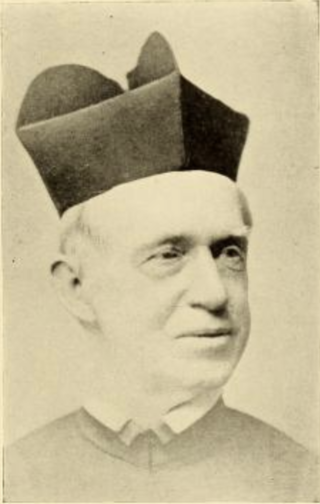
William Francis Clarke was an American Catholic priest and Jesuit who held several senior positions at Jesuit institutions in Maryland and Washington, D.C. Born in Washington, he descended from several early colonial families of Maryland. He was educated at Gonzaga College and its successor institutions during the suppression of the Society of Jesus, followed by Georgetown College. After his entrance into the Jesuit order, he taught for several years at Georgetown, and became the pastor of St. Joseph's Church in Baltimore, where he took uncommon measures to integrate black Catholics and Italian immigrants into parish life.
Francis Xavier Talbot was an American Catholic priest and Jesuit who was active in Catholic literary and publishing circles, and became the President of Loyola College in Maryland. Born in Philadelphia, he entered the Society of Jesus in 1906, and was educated at St. Andrew-on-Hudson and Woodstock College. He taught for several years in New York City and at Boston College, before entering publishing as the literary editor of America magazine in 1923, of which he became the editor-in-chief in 1936. While in this role, he was also active in founding and editing several academic journals, including Thought, and establishing various Catholic literary societies and book clubs. During World War II, he was chaplain to a Catholic organization that previewed movies for the National Legion of Decency. He also supported Franco's rule in Spain because of its support of Catholicism and opposition to communism; he also supported the US war effort. He was described as one of the early leaders of the revival of Catholic literature in the United States.
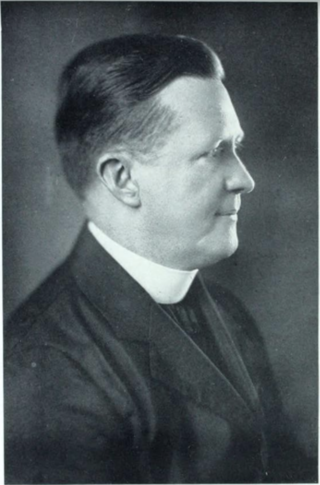
Joseph A. Canning was an American Catholic priest and Jesuit. Hailing from New York City, he studied at St. Francis Xavier High School, before entering the Society of Jesus in 1898. He continued his studies at St. Andrew-on-Hudson and Woodstock College. He was ordained a priest in 1915, and spent the next eight years as a missionary in Jamaica.
Joseph O'Callaghan was an American Catholic priest and Jesuit. Born in Massachusetts, he studied in Canada and then at the College of the Holy Cross before entering the Society of Jesus in 1844. O'Callaghan taught at Georgetown University before becoming the president of Loyola College in Maryland in 1860, where he remained for three years. In 1869, he was sent to Rome to represent the Jesuit Province of Maryland at the congregation of procurators. He died at sea while returning from the congregation.

William F. Gannon was an American Catholic priest and Jesuit who was the president of Boston College from 1903 to 1907. Born in Cambridge, Massachusetts, he entered the Society of Jesus in 1876 and studied at Woodstock College. Before becoming president of Boston College, he then taught at Jesuit schools, including the College of the Holy Cross, Saint Peter's College, Fordham University, and Georgetown University. After his presidency, he engaged in pastoral work in New York City and Philadelphia.
Edward D. Boone was an American Catholic priest and Jesuit who was the president of the College of the Holy Cross from 1878 to 1883. Born in Washington, D.C., he graduated from Holy Cross in 1851 and entered the Society of Jesus the following year. Before becoming president, he taught at various Jesuit colleges. He spent the last twenty-five years of his life at Loyola College in Maryland.
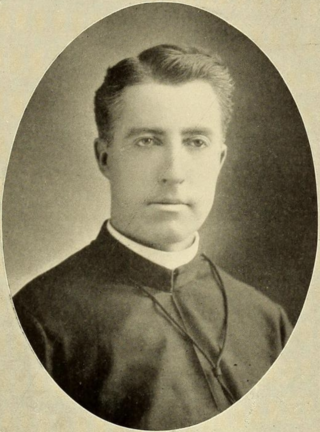
John F. Quirk was an American Catholic priest and Jesuit who was the president of Loyola College in Maryland from 1901 to 1907. Born in Boston, he studied at Boston College before entering the Society of Jesus in 1876.
